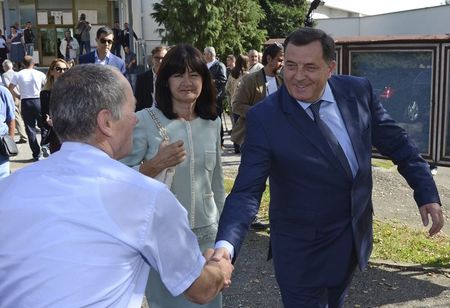By Daria Sito-Sucic and Maja Zuvela
SARAJEVO (Reuters) - Nationalists deeply divided over the future of Bosnia have extended their rule over the Balkan country, offering scant hope of genuine change to a political system designed to end a war but seen as ineffective in peace.
With a majority of votes from Sunday's elections for national, regional and local representatives, the main nationalist parties from the Bosniak, Serb and Croat communities looked to have held on to power.
They include the SNSD of Bosnian Serb leader Milorad Dodik, who advocates Bosnia's dissolution; the SDA of Bosniak leader Bakir Izetbegovic who wants a strong, unified state; and the Croat HDZ, which calls for splitting power even further to create a Croat entity within Bosnia.
The three blocs have dominated government in Bosnia for years, sharing power in an unwieldy system of ethnic quotas created by U.S. peace negotiators in Dayton, Ohio, to end the 1992-95 war.
They are so far apart on policy that limited Western efforts to encourage reform have frequently gone nowhere.
Anger over factory closures, joblessness and endemic corruption triggered an unprecedented spasm of civil unrest in February, fuelling talk of change. But little came of it.
Turnout was 54 percent, but as many as 10 percent of ballots cast were spoiled in protest. Both the SDA and HDZ increased their share of power, while Dodik's SNSD lost the race for the Serb member of Bosnia's largely ceremonial tripartite presidency. It held on to power in the country's autonomous Serb Republic.
All three command huge networks of political patronage through the power of public sector jobs, of which there are many given Bosnia's highly decentralised system of power.
"I didn't have much hope that anything would change, but I couldn't dream that we would backtrack like this; it's a disaster, Bosnia is going backwards," said Sarajevan Emira Dusinovic.
It may yet take months for Bosnia's six layers of government to take shape, more lost time for an economy already hit by devastating floods in May that inflicted damage totalling about 2 billion euros ($2.5 billion) (1.55 billion pound) .
Some analysts fear a repeat of the February violence if the situation facing ordinary Bosnians does not improve. Observers highlighted the relatively high number of spoiled ballots.
"You can stay away; you can join the half of citizens who did not participate in the vote," said Tiny Cox of the Council of Europe rights body.
"But if you take the time and trouble to go to the polling station, it also shows they do not have enough trust in the system, and that should be a signal for political parties and politicians."

Organization for Security and Co-operation in Europe official Roberto Battelli said: "The lack of political will to move beyond the Dayton agreement prevents the country from moving away from the current inter-ethnic divides and towards real progress for the country."
(Writing by Matt Robinson Editing by Jeremy Gaunt)
